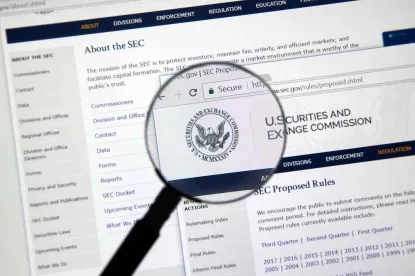Rule 2-01 of Regulation S-X currently requires auditors to be independent of their audit clients both “in fact and in appearance.” Under the current rule, an “audit client” is defined to include any affiliate of the entity under audit, including any entity controlling, controlled by or under common control with the entity under audit (also known as a “sister entity”), and, with respect to a registered investment company, the company’s investment adviser or sponsor and any other entity in the same investment company complex.
On October 16, 2020, the SEC adopted amendments to Rule 2-01 of Regulation S-X to, among other things, institute a “dual materiality standard” for assessing auditor independence with respect to sister entities, including entities in the same investment company complex. In addition to adopting the dual material standard, the SEC made certain other amendments to reduce the regulatory burden on audit clients and audit firms in certain circumstances in which, as a practical matter, an auditor’s objectivity and impartiality are not impaired despite technical noncompliance with Rule 2-01.
-
Dual materiality for audit affiliates. Under the new dual materiality standard, both the entity under audit and a sister entity for which the auditor provides services must be material to a common controlling entity to impair an auditor’s independence. The SEC did not provide specific guidance on the materiality standard, suggesting that auditors and clients determine materiality using standards developed in compliance with current audit rules. An auditor’s relationships with non-affiliated sister entities will continue to be subject to the general independence standard. As a result, auditors and clients will need to continue to be aware of and monitor services to and relationships with non-affiliate sister entities.
-
Shortened look-back period for first-time filers. Under amended Rule 2 01, with respect to engagements with domestic companies preparing to file an initial public offering or otherwise register with the SEC for the first time, auditors will be required to examine relationships for a one-year period prior to filing in order to determine independence. Previously, auditors effectively were required to look back three years.
-
New categorical exclusions. The amended rule adds certain student loans and de minimis consumer loans, including credit cards, to the list of categorical exclusions from independence-impairing lending relationships.
-
Prohibited business relationships. Amended Rule 2-01 eliminates the reference to “substantial stockholders” in the list of prohibited business relationships between an auditor and its audit client and replaces it with a reference to a beneficial owner with “significant influence” over the entity under audit, thereby narrowing the scope of this prohibition.
-
Impaired auditor independence as a result of mergers or acquisitions. Amended Rule 2-01 introduces a transition framework to address inadvertent independence violations that arise only as a result of a merger or acquisition transaction.
The rule change will take effect 180 days after publication in the Federal Register.
The adopting release is available here.


 />i
/>i

